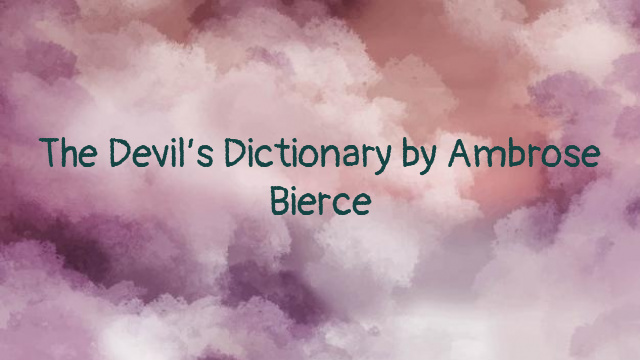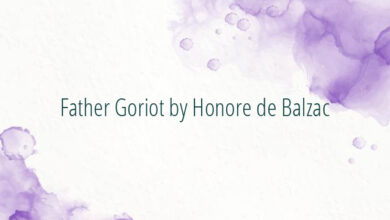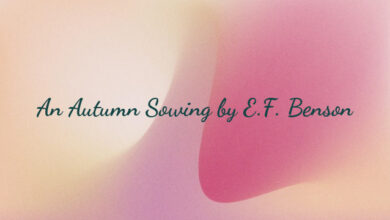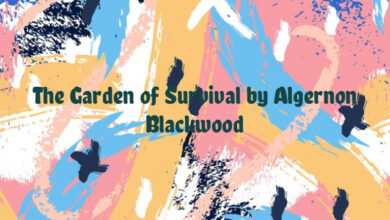
The Devil’s Dictionary by Ambrose Bierce
Originally published as The Cynic’s Word Book, Ambrose Bierce’s wickedly satirical “reference book” was retitled The Devil’s Dictionary in 1911.
Preface
The Devil’s Dictionary was begun in a weekly paper in 1881, and was continued in a desultory way at long intervals until 1906. In that year a large part of it was published in covers with the title The Cynic’s Word Book, a name which the author had not the power to reject or happiness to approve. To quote the publishers of the present work: “This more reverent title had previously been forced upon him by the religious scruples of the last newspaper in which a part of the work had appeared, with the natural consequence that when it came out in covers the country already had been flooded by its imitators with a score of ‘cynic’ books — The Cynic’s This, The Cynic’s That, and The Cynic’s Other. Most of these books were merely stupid, though some of them added the distinction of silliness. Among them, they brought the word “cynic” into disfavor so deep that any book bearing it was discredited in advance of publication. Meantime, too, some of the enterprising humorists of the country had helped themselves to such parts of the work as served their needs, and many of its definitions, anecdotes, phrases and so forth, had become more or less current in popular speech. This explanation is made, not with any pride of priority in trifles, but in simple denial of possible charges of plagiarism, which is no trifle. In merely resuming his own the author hopes to be held guiltless by those to whom the work is addressed — enlightened souls who prefer dry wines to sweet, sense to sentiment, wit to humor and clean English to slang. A conspicuous, and it is hope not unpleasant, feature of the book is its abundant illustrative quotations from eminent poets, chief of whom is that learned and ingenius cleric, Father Gassalasca Jape, S.J., whose lines bear his initials. To Father Jape’s kindly encouragement and assistance the author of the prose text is greatly indebted.
He willed away his whole estate,
And then in death he fell asleep,
Murmuring: "Well, at any rate,
My name unblemished I shall keep."
But when upon the tomb 'twas wrought
Whose was it? -- for the dead keep naught.
Durang Gophel Arn
A king, in times long, long gone by,
Said to his lazy jester:
"If I were you and you were I
My moments merrily would fly --
Nor care nor grief to pester."
"The reason, Sire, that you would thrive,"
The fool said -- "if you'll hear it --
Is that of all the fools alive
Who own you for their sovereign, I've
The most forgiving spirit."
Oogum Bem
a crowd of wretched souls
That stay his cure: their malady convinces
The great essay of art; but at his touch,
Such sanctity hath Heaven given his hand,
They presently amend,
as the "Doctor" in Macbeth hath it. This useful property of the royal hand could, it appears, be transmitted along with other crown properties; for according to "Malcolm,"
'tis spoken
To the succeeding royalty he leaves
The healing benediction.
But the gift somewhere dropped out of the line of succession: the later sovereigns of England have not been tactual healers, and the disease once honored with the name "king's evil" now bears the humbler one of "scrofula," from scrofa, a sow. The date and author of the following epigram are known only to the author of this dictionary, but it is old enough to show that the jest about Scotland's national disorder is not a thing of yesterday.
Ye Kynge his evill in me laye,
Wh. he of Scottlande charmed awaye.
He layde his hand on mine and sayd:
"Be gone!" Ye ill no longer stayd.
But O ye wofull plyght in wh.
I'm now y-pight: I have ye itche!
The superstition that maladies can be cured by royal taction is dead, but like many a departed conviction it has left a monument of custom to keep its memory green. The practice of forming a line and shaking the President's hand had no other origin, and when that great dignitary bestows his healing salutation on
strangely visited people,
All swoln and ulcerous, pitiful to the eye,
The mere despair of surgery,
he and his patients are handing along an extinguished torch which once was kindled at the altar-fire of a faith long held by all classes of men. It is a beautiful and edifying "survival" -- one which brings the sainted past close home in our "business and bosoms."
Once a warrior gentle of birth,
Then a person of civic worth,
Now a fellow to move our mirth.
Warrior, person, and fellow -- no more:
We must knight our dogs to get any lower.
Brave Knights Kennelers then shall be,
Noble Knights of the Golden Flea,
Knights of the Order of St. Steboy,
Knights of St. Gorge and Sir Knights Jawy.
God speed the day when this knighting fad
Shall go to the dogs and the dogs go mad.




